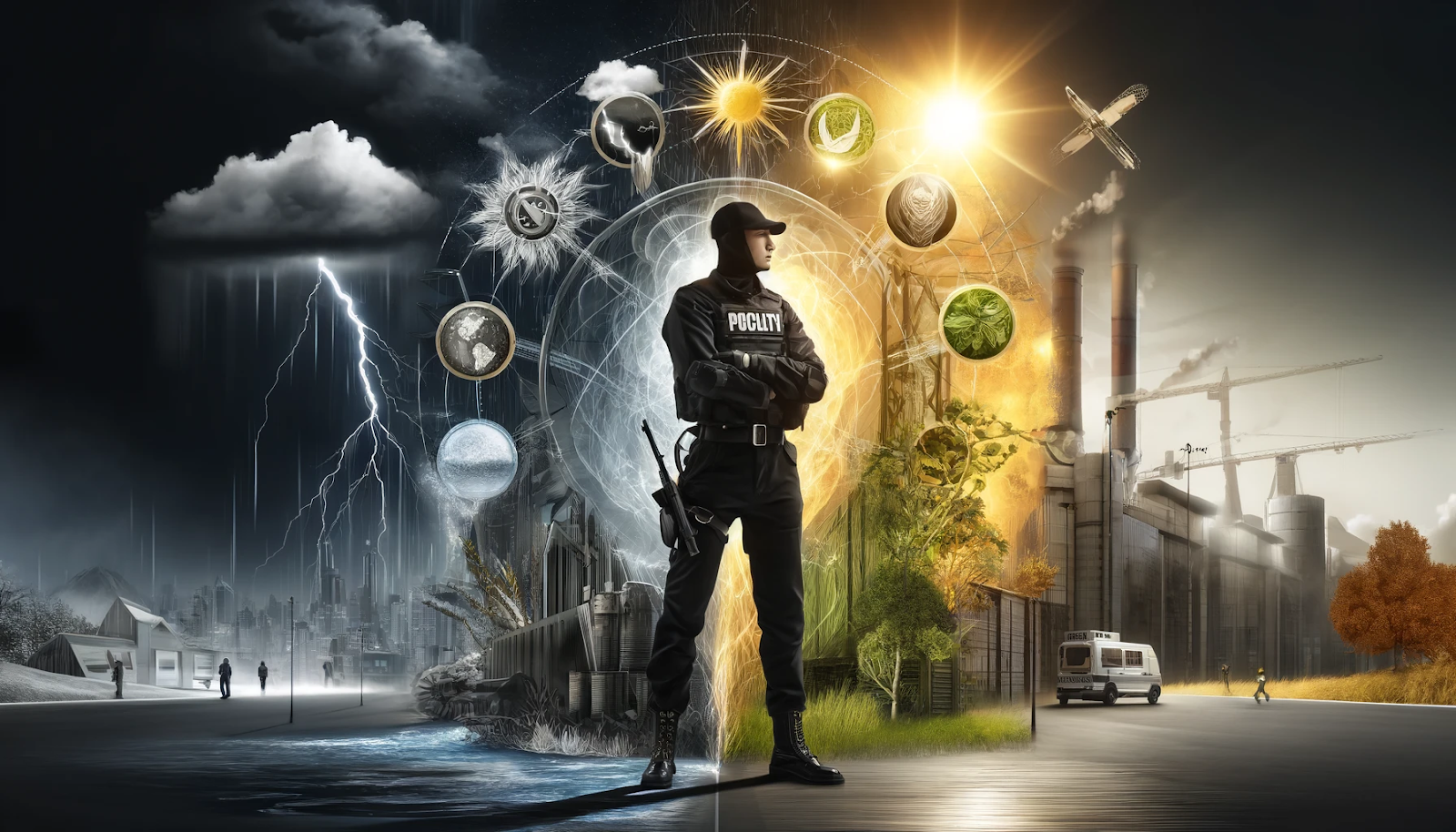Introduction
Security guards play a crucial role in maintaining the safety and security of various properties. However, their duties often expose them to various environmental hazards that can compromise their well-being and effectiveness. Educating security guards on recognizing and mitigating these hazards is essential to ensure their safety and the security of the premises they protect. This blog post will explore the common environmental hazards security guards may face and provide practical tips for managing these risks.
Common Environmental Hazards
Weather Conditions
Security guards often work outdoors and are exposed to various weather conditions. Extreme heat, cold, rain, snow, and storms can all pose significant risks.
- Heat: Risk of heat exhaustion or heat stroke.
- Cold: Risk of hypothermia or frostbite.
- Rain: Increased risk of slips, trips, and falls.
- Storms: Potential for falling debris and lightning strikes.
Biological Hazards
Biological hazards include exposure to harmful plants, animals, insects, and pathogens.
- Plants: Poison ivy, oak, and sumac can cause skin irritation.
- Animals: Bites or attacks from dogs, snakes, or other wildlife.
- Insects: Stings or bites from bees, mosquitoes, and ticks can lead to allergic reactions or diseases.
- Pathogens: Exposure to viruses, bacteria, and other microorganisms.
Chemical Hazards
Security guards may come into contact with hazardous chemicals, especially if they work in industrial or laboratory settings.
- Cleaning agents: Can cause skin irritation or respiratory issues.
- Industrial chemicals: Risk of burns, poisoning, or long-term health effects.
Physical Hazards
Physical hazards are common in areas with ongoing construction, heavy machinery, or poor lighting.
- Construction sites: Risk of falling objects or getting struck by machinery.
- Heavy machinery: Potential for accidents involving forklifts, cranes, etc.
- Poor lighting: Increases the risk of accidents and criminal activity.
Mitigating Environmental Hazards
Training and Education
Proper training and education are crucial for preparing security guards to handle environmental hazards. Regular training sessions should cover:
- Hazard recognition: Identifying potential dangers in the work environment.
- First aid: Basic first aid skills to handle emergencies.
- Personal protective equipment (PPE): Proper use of PPE such as gloves, boots, and reflective vests.
Communication and Reporting
Effective communication is vital for managing environmental hazards. Security guards should:
- Report hazards: Promptly report any identified hazards to supervisors.
- Emergency contacts: Know emergency contact numbers and procedures.
- Use of communication devices: Ensure they have functional radios or mobile phones.
Safety Protocols
Implementing and following strict safety protocols can significantly reduce the risk of environmental hazards.
- Weather precautions: Take breaks in shaded or sheltered areas during extreme weather.
- Biological hazard prevention: Wear protective clothing and use insect repellent.
- Chemical safety: Use appropriate PPE and follow handling instructions for chemicals.
- Physical hazard mitigation: Stay clear of active construction zones and use proper lighting.
Regular Equipment Checks
Regularly checking and maintaining equipment is essential to ensure safety.
- PPE checks: Regularly inspect and replace PPE as needed.
- Lighting: Ensure all areas are well-lit, especially during night shifts.
- Communication devices: Check that all communication devices are in working order.
Conclusion
Environmental hazards are a significant concern for security guards, but with proper training, communication, and adherence to safety protocols, these risks can be managed effectively. Property managers, chief security officers, and security company hiring managers should prioritize educating their security personnel about these hazards to ensure a safe working environment and enhance the overall security of their properties.
FAQs
What are the common environmental hazards for security guards?
Security guards commonly face extreme weather conditions, biological threats (plants, animals, insects), chemical exposures, and physical hazards like construction sites and heavy machinery.
How can security guards mitigate weather-related hazards?
Security guards can mitigate weather-related hazards by wearing appropriate clothing, taking breaks in shaded or sheltered areas, and staying hydrated in hot weather. During cold weather, they should wear layers and protect exposed skin.
Why is regular equipment maintenance important?
Regular equipment maintenance ensures that personal protective equipment (PPE), communication devices, and lighting are in good working condition, which is crucial for the safety and effectiveness of security guards.
How should security guards handle biological hazards?
Security guards should wear protective clothing, use insect repellent, and avoid contact with harmful plants and animals. They should also be trained in first aid to handle bites or stings.
What role does communication play in managing environmental hazards?
Effective communication allows security guards to report hazards promptly, access emergency contacts quickly, and coordinate incident responses, which is essential for maintaining safety.
.png)
.png)
.png)

.png)
.png)

.png)
.png)
.png)
.png)
